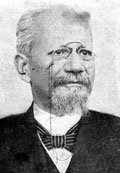The son of a Portuguese merchant and landowner, Francisco de Paula Rodrigues Alves graduated from the Faculty of Law in São Paulo (1870). He served as a public prosecutor at Guaratinguetá and São Paulo. As a Conservative Party candidate, he was elected to the state legislature of São Paulo of 1872-1875 and 1878-1879. In 1875-1878 Rodrigues Alves practiced law and founded two agricultural enterprises. In 1878-1884 he was a municipal councilor and president of the Municipal Chamber of Guaratinguetá. After his election as a deputy of the imperial Chamber of Deputies (1885-1887), Rodrigues Alves was appointed President of the Province of São Paulo (1887-1888). On 19 Aug 1888 Princess Regent Isabel conferred on him the title of state councilor (conselheiro do estado). With proclamation of the Republic (15 Nov 1889), Rodrigues Alves returned to Guaratinguetá and was elected to the National Constituent Congress (1890-1891). He took the portfolio of finance minister (26 Nov 1891 - 31 Aug 1892) in the government of Floriano Peixoto and was elected senator for São Paulo (1893-1894). Rodrigues Alves resigned his seat in the Senate to join the cabinet of Prudente de Morais as finance minister (15 Nov 1894 - 20 Nov 1896) and then returned to the Senate (1897-1900). In 1900 Rodrigues Alves was elected President of the State of São Paulo (1 May 1900 - 13 Feb 1902), but stepped down to stand for election as President of the Republic. After his inauguration as president, Rodrigues Alves focused his attention on the program of urban reconstruction and sanitation including the modernization of Rio de Janeiro. The administration worked out a program for improving public health care to combat most dangerous diseases, such as bubonic plague and yellow fever. However vaccination met stubborn resistance among the population culminating in the Vaccine Revolt in November 1904. The policy of territorial expansion carried out by foreign minister José Maria da Silva Paranhos (Barão do Rio Branco) won Brazil about 886,000 square kilometers of territory. The Independent State of Acre proclaimed in 1899 as a result of local revolution was reincorporated with Brazil according to the Treaty of Petrópolis (17 Nov 1903). As coffee overproduction threatened national prosperity, representatives of the three major coffee-producing states, São Paulo, Minas Gerais and Rio de Janeiro, signed a federal government-backed agreement at Taubaté in 1906 to guarantee a fair world market price for coffee. Rodrigues Alves was ineligible to stand for immediate re-election and traveled to Europe (1907). Upon his return he was again elected President of the State of São Paulo (1 May 1912 - 1 May 1916). After he completed his term, he was elected senator for São Paulo (1916-1918) and resigned his seat to be elected President of the Republic for the second time (1 Mar 1918). However, Rodrigues Alves was unable to take the oath of office as he contracted the "Spanish" influenza and on 15 Nov 1918 vice president Delfim Moreira assumed the presidency. Rodrigues Alves moved from Guaratinguetá to Rio de Janeiro sending instructions to the vice president from his sickbed. Despite high hopes for his recovery he died on 16 Jan 1919. [2] |
| Candidate |
Popular vote (1 Mar 1902) |
| Francisco de Paula Rodrigues Alves |
529,039 |
| Quirino Antônio Ferreira de Sousa (aka Quirino Bocaiúva) |
42,542 |
| Ubaldino do Amaral Fontoura |
5,371 |
| Júlio Prates de Castilhos |
1,343 |
| 73 others |
2 or more votes |
| Candidate |
Popular vote (1 Mar 1918) |
| Francisco de Paula Rodrigues Alves |
386,467 |
| Nilo Procópio Peçanha |
1,258 |
| Rui Barbosa de Oliveira |
1,014 |
| 47 others |
2 or more votes |
|

